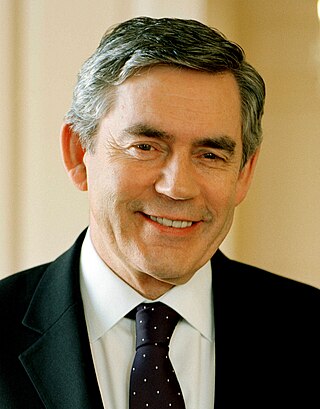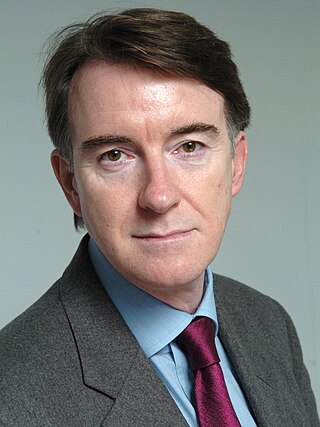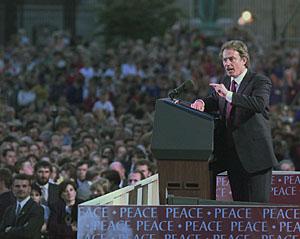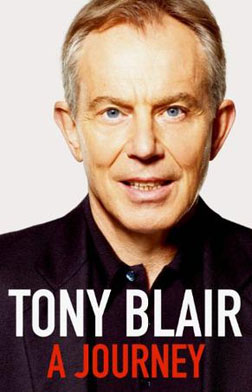Related Research Articles

James Gordon Brown is a British politician who was Prime Minister of the United Kingdom and Leader of the Labour Party from 2007 to 2010. He previously was Chancellor of the Exchequer under Tony Blair from 1997 to 2007. He was Member of Parliament (MP) for Dunfermline East from 1983 to 2005, and Kirkcaldy and Cowdenbeath from 2005 to 2015. As of June 2024, Brown is the most recent Labour Party prime minister and the most recent not to be from England.
Alexander Andrew Mackay Irvine, Baron Irvine of Lairg,, known as Derry Irvine, is a Scottish lawyer, judge and politician who served as Lord Chancellor from 1997 to 2003.

Peter Benjamin Mandelson, Baron Mandelson, is a British Labour Party politician who served as First Secretary of State from 2009 to 2010. He was President of the Board of Trade in 1998 and from 2008 to 2010. He is the president of international think tank Policy Network, honorary president of the Great Britain–China Centre, and chairman of strategic advisory firm Global Counsel. Mandelson is often referred to as a Blairite.

John Whitaker Straw is a former British politician who served in the Cabinet from 1997 to 2010 under the Labour governments of Tony Blair and Gordon Brown. He held two of the traditional Great Offices of State, as Home Secretary from 1997 to 2001, and Foreign Secretary from 2001 to 2006 under Blair. He was a Member of Parliament (MP) for Blackburn from 1979 to 2015.

In British politics, Blairism is the social democratic political ideology of Tony Blair, the former leader of the Labour Party and Prime Minister between 1997 and 2007, and those that support him, known as Blairites. It entered the New Penguin English Dictionary in 2000. Elements of the ideology include investment in public services, expansionary efforts in education to encourage social mobility, and increased actions in terms of mass surveillance alongside a ramping up of law enforcement powers, both of these latter changes advocated in the context of fighting organized crime and terrorism. Blairites have additionally been known for their contrast with the traditional support for socialism by those believing in left-wing politics, with Blair himself and others speaking out against the nationalisation of major industries and against also heavy regulations of business operations. On foreign policy, Blairism is supportive of close relations with the United States and liberal interventionism, including advocacy for both the Iraq war and the War in Afghanistan (2001–2021).

Mark Richard Tami is a Welsh Labour Party politician who has been the Member of Parliament (MP) for Alyn and Deeside since 2001. He has served as Opposition Deputy Chief Whip in the House of Commons since 2023.

Jon Hedley Trickett is a British Labour Party politician who has been the Member of Parliament (MP) for Hemsworth in West Yorkshire since a 1996 by-election. He was Shadow Lord President of the Council from 2016 to 2020 and served as Shadow Minister for the Cabinet Office from 2011 to 2013 and 2017 to 2020. He was the Labour Party National Campaign Coordinator under Jeremy Corbyn from 2015 to 2017.

The Downing Street memo, sometimes described by critics of the Iraq War as the smoking gun memo, is the note of a 23 July 2002 secret meeting of senior British government, defence and intelligence figures discussing the build-up to the war, which included direct reference to classified United States policy of the time. The name refers to 10 Downing Street, the residence of the British prime minister.
On 18 September 2004 the British Daily Telegraph ran two articles titled "Secret papers show Blair was warned of Iraq chaos" and 'Failure is not an option, but it doesn't mean they will avoid it' by reporter Michael Smith, revealing the contents of six leaked British government documents – labelled "secret" or "confidential" – concerning the lead-up to the war in Iraq.
In November 2005 Civil servant David Keogh was charged with offences under section 3, and parliamentary researcher Leo O'Connor under section 5, of the Official Secrets Act 1989 in the United Kingdom. Both men were of Northampton, England.
The Al Jazeera bombing memo is an unpublished memorandum made within the British government which is said to be the minutes of a discussion between United States President George W. Bush and Prime Minister Tony Blair. The Daily Mirror published a story on its front page on 22 November 2005 that said the memo quotes Bush speculating about a US bombing raid on Al Jazeera's world headquarters in the Qatari capital Doha and other locations. The story said that Blair persuaded Bush to take no action.

Sir Anthony Charles Lynton Blair is a British politician who was Prime Minister of the United Kingdom from 1997 to 2007 and Leader of the Labour Party from 1994 to 2007. He was Leader of the Opposition from 1994 to 1997 and held various shadow cabinet posts from 1987 to 1994. Blair was Member of Parliament (MP) for Sedgefield from 1983 to 2007. He is the second-longest-serving prime minister in post-war British history after Margaret Thatcher, the longest-serving Labour politician to have held the office, and the first and only person to date to lead the party to three consecutive general election victories.

Gordon Brown's term as the prime minister of the United Kingdom began on 27 June 2007 when he accepted an invitation of Queen Elizabeth II to form a government, replacing Tony Blair, and ended on 11 May 2010 upon his resignation. While serving as prime minister, Brown also served as the first lord of the treasury, the minister for the civil service, and the leader of the Labour Party. He and Blair both extensively used the New Labour branding while in office, which was presented as the brand of a newly reformed party that had altered Clause IV and endorsed market economics, though Brown's style of government differed from that of his predecessor. Brown is the most recent Labour politician as well as the most recent Scottish politician to hold the office of prime minister.

Philip Gould, Baron Gould of Brookwood was a British political consultant, and former advertising executive, who worked for the Labour Party.

The United Kingdom parliamentary expenses scandal was a major political scandal that emerged in 2009, concerning expense claims made by members of the British Parliament in both the House of Commons and the House of Lords over the previous years. The disclosure of widespread misuse of allowances and expenses permitted to members of Parliament (MPs) aroused widespread anger among the UK public and resulted in a large number of resignations, sackings, de-selections and retirement announcements together with public apologies and the repayment of expenses. Several members, and former members, of both the House of Commons and the House of Lords were prosecuted and sentenced to terms of imprisonment.

The Iraq Inquiry was a British public inquiry into the nation's role in the Iraq War. The inquiry was announced in 2009 by Prime Minister Gordon Brown and published in 2016 with a public statement by Chilcot.

Edward Michael Balls is a British broadcaster, economist and former politician. He served as Secretary of State for Children, Schools and Families from 2007 to 2010, and as Shadow Chancellor of the Exchequer from 2011 to 2015. A member of Labour Co-op, he was the Member of Parliament (MP) for Normanton and later for Morley and Outwood between 2005 and 2015.
In British politics, Brownism is the social democratic political ideology of the former Prime Minister and leader of the Labour Party Gordon Brown and those that follow him. Proponents of Brownism are referred to as Brownites.

A Journey is a memoir by Tony Blair of his tenure as Prime Minister of the United Kingdom. Published in the UK on 1 September 2010, it covers events from when he became leader of the Labour Party in 1994 and transformed it into "New Labour", holding power for a party record three successive terms, to his resignation and replacement as prime minister by his Chancellor of the Exchequer, Gordon Brown. Blair donated his £4.6-million advance, and all subsequent royalties, to the British Armed Forces charity the Royal British Legion. It became the fastest-selling autobiography of all time at the bookstore chain Waterstones. Promotional events were marked by anti-war protests.
The Guantánamo Bay files leak began on 24 April 2011, when WikiLeaks, along with The New York Times, NPR and The Guardian and other independent news organizations, began publishing 779 formerly secret documents relating to detainees at the United States' Guantánamo Bay detention camp established in 2002 after its invasion of Afghanistan in 2001. The documents consist of classified assessments, interviews, and internal memos about detainees, which were written by the Pentagon's Joint Task Force Guantanamo, headquartered at Guantanamo Bay Naval Base. The documents are marked "secret" and NOFORN.
References
- ↑ Conrad Quilty-Harper (10 June 2011). "Labour spending: the Ed Balls files database released". The Daily Telegraph . Retrieved 11 June 2011.
- ↑ Nicholas Watt (10 June 2011). "Memos show Ed Balls's role in 'Project Volvo' plot to oust Tony Blair". The Guardian. Retrieved 11 June 2011.
- 1 2 3 4 Robert Winnett, James Kirkup and Holly Watt (10 June 2011). "Labour spending: Gordon Brown and Ed Balls ignored warnings and wasted billions". The Daily Telegraph . Retrieved 11 June 2011.
- ↑ Andrew Grice (11 June 2011). "Balls blames Tories for leak of Blair papers". The Independent . Retrieved 11 June 2011.
- ↑ "Interview: Ed Balls". New Statesman. 20 March 2006. Retrieved 13 June 2011.
- 1 2 3 Robert Winnett, and Holly Watt (9 June 2011). "Labour coup: secret letters reveal how Ed Balls plotted to overthrow Tony Blair". The Daily Telegraph . Retrieved 12 June 2011.
- 1 2 Hélène Mulholland (13 July 2010). "Ed Balls denies he was part of 'insurgency' against Tony Blair". The Guardian. Retrieved 11 June 2011.
- 1 2 Toby Young (10 June 2011). "Last year Ed Balls dismissed allegations he was at centre of plot to oust Blair as 'complete and utter total balderdash and rubbish'". The Daily Telegraph . Archived from the original on 12 June 2011. Retrieved 11 June 2011.
- 1 2 3 "Ed Balls denies role in 'coup plot'". The Independent . 11 June 2011. Retrieved 13 June 2011.
- ↑ Nicholas Watt (10 June 2011). "Document leak to be investigated after Ed Balls complaint". The Guardian. Retrieved 11 June 2011.
- ↑ Michael White (10 June 2011). "Ed Balls a plotter? That much we knew already". The Guardian. Retrieved 11 June 2011.
- ↑ Steve Richards (11 June 2011). "Explosive memos? Calm down, dears". The Independent . Retrieved 11 June 2011.
- 1 2 George Eaton (10 June 2011). "Operation Target Ed Balls". New Statesman . Retrieved 11 June 2011.